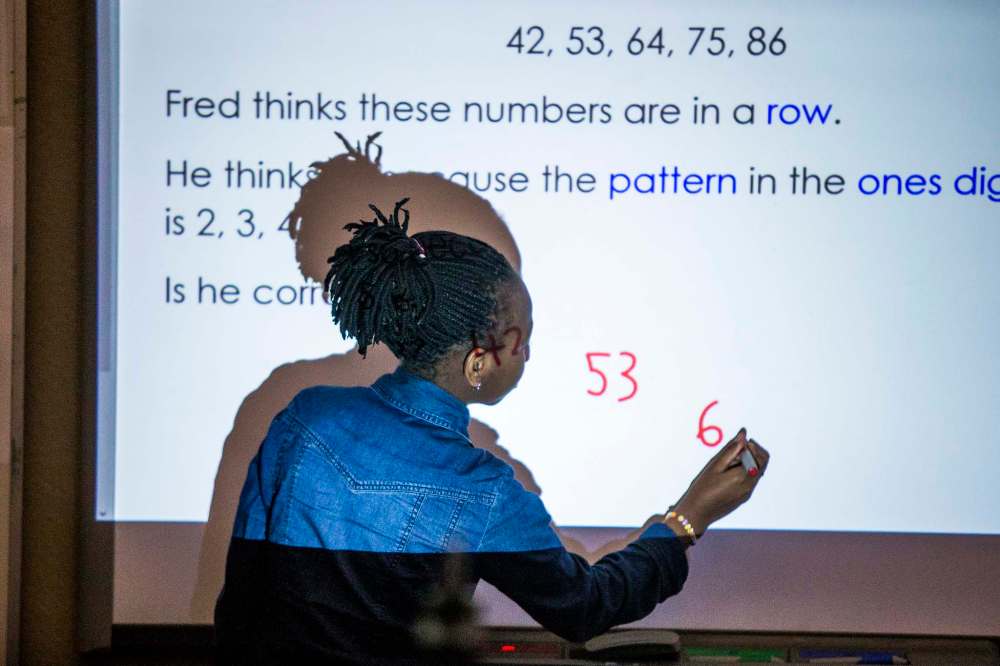Math, literacy scores on upswing at WSD
School division report highlights improvements
Advertisement
Read this article for free:
or
Already have an account? Log in here »
To continue reading, please subscribe:
Monthly Digital Subscription
$1 per week for 24 weeks*
- Enjoy unlimited reading on winnipegfreepress.com
- Read the E-Edition, our digital replica newspaper
- Access News Break, our award-winning app
- Play interactive puzzles
*Billed as $4.00 plus GST every four weeks. After 24 weeks, price increases to the regular rate of $19.95 plus GST every four weeks. Offer available to new and qualified returning subscribers only. Cancel any time.
Monthly Digital Subscription
$4.99/week*
- Enjoy unlimited reading on winnipegfreepress.com
- Read the E-Edition, our digital replica newspaper
- Access News Break, our award-winning app
- Play interactive puzzles
*Billed as $19.95 plus GST every four weeks. Cancel any time.
To continue reading, please subscribe:
Add Free Press access to your Brandon Sun subscription for only an additional
$1 for the first 4 weeks*
*Your next subscription payment will increase by $1.00 and you will be charged $16.99 plus GST for four weeks. After four weeks, your payment will increase to $23.99 plus GST every four weeks.
Read unlimited articles for free today:
or
Already have an account? Log in here »
Hey there, time traveller!
This article was published 15/01/2020 (2209 days ago), so information in it may no longer be current.
The Winnipeg School Division is giving itself high marks for improvement, with a new report touting better results in math and literacy test scores for the second consecutive year.
The city’s largest school division’s second annual Continuous Improvement Report, which publicly highlights efforts to enhance performance and sets targets for the future, includes data going back a decade.
A news release issued Wednesday focused on the report’s most impressive statistics, including a dramatic 146 per cent increase in Grade 3 numeracy achievement over the past 10 years, and improved pass rates for Grade 12 mathematics achievement tests since 2014.

“This report shows significant improvement in student success, academically, in the Winnipeg School Division, year over year,” said board chairman Chris Broughton.
Broughton attributed the improvements to a number of factors, including a 2015 restructuring of senior administration, targeted investments in programming for students, hardworking staff, and community support for initiatives such as school nutrition programs.
The report shows an upward trend in the division’s high school graduation rates since 2009, even as enrolment numbers remained mostly steady.
The number of diplomas awarded increased to 2,144 in 2019 from 1,611 in 2009.
Despite the overall trend towards improvement in recent years, other data in the report show some scores still lag behind provincial averages, such as the Grade 12 provincial achievement test for English language arts and the Grade 12 applied mathematics achievement test.
“It isn’t all good news, this isn’t a report card with all A’s,” Broughton acknowledged.
“There are definitely areas that we need to work on, and I think, by us sharing the data of the places that we still need to improve, that we’re being transparent on what we’re working on (and) what we still need to achieve.”
Broughton said the school division, which has 33,000 students in 78 schools with nearly 6,500 staff, faces key challenges. Those include teaching pupils who are new arrivals to Canada and those who live with poverty and safety issues at home. Children in the care of Child and Family Services comprise almost five per cent of its student population, the report says.
“Those aren’t small barriers to overcome,” said Broughton.
“But despite all of that, the work that we’ve been doing specifically targeted at some of those students that are hardest to reach — children in care, those kind of students — we’re seeing significant success there… I think we’re trending in the right direction.”
Manitoba’s education system earned negative press in December, when the province fared poorly in Program for International Student Assessment (PISA) results released by the Organisation for Economic Co-operation and Development.
“Certainly, one of the things that is often cited in those PISA results is that, the reason why some of the results are the way that they are is because of our poverty in Manitoba, and the context in which we’re teaching, and that is certainly confounding for teachers,” said Lesley Trudel, an assistant professor of education at the University of Winnipeg and a former assistant superintendent of the Sunrise School Division.
“Certainly, the Winnipeg School Division is situated in an area where there is potentially high child poverty, and so I could see that challenges would arise as a result of that context.”
Meanwhile, Manitoba’s education community is generally concerned about the outcome of the province’s primary education review, Trudel added.
“I think there’s a concern that all of the good things that are going on in school divisions, amazing things like this report talks about, are not going to be sustainable, or be able to be continued, if the system changes drastically,” she said.
Manitoba Education Minister Kelvin Goertzen was unavailable to comment Wednesday.
solomon.israel@freepress.mb.ca
Twitter: @sol_israel

